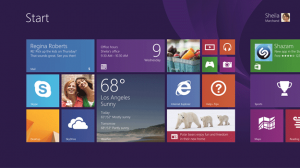Recently I attended a family event and being the family member with lots of tech knowledge, I was asked about computers. One of the things that came up was Windows 8. Part of this was because an uncle had his laptop stolen but he did not want to spend much on a new computer and did not want Windows 8. He ended up purchasing a used laptop similar to his own to avoid the whole Windows 8 issue. Several other relatives mentioned that they did not intend to purchase any computers that featured the new operating system because it was too different and hard to use. Based upon the different changes mentioned (but not demonstated yet), I doubt that my relatives would change their mind and purchase a system with Windows 8.1 with the Update 1 changes.
This problem also reaches beyond just individuals buying personal computers. Corporations are a much larger segment of the personal computer market now that consumers have migrated to more smart phones and tablets. They are still entrenched in the Windows 7 operating system and unlikely to switch to Windows 8 anytime soon. After all, many companies clung to Windows XP as long as they could such that Microsoft kept extended its support.
Strategy 2: Lower Cost of Windows
Another item mentioned by Microsoft is a . Don’t get too excited by this statement though. This is a conditional licensing deal that Microsoft has used in the past with netbooks. Essentially, low cost systems that would be priced under $250 would have the costs for Windows reduced. If the PC or device costs more than that, the price remains unchanged. This is a direct response to the growing trend of low cost devices such as tablets, smart phones and Chromebooks.
This tactic worked fairly well during the netbook days as most of the original netbooks were released with Linux. After Microsoft changed their licensing deals and introduced the the Windows Basic option, many netbooks switched back to the Microsoft operating system. Of course, once the netbooks sales fell off, this version of the operating system and its licensing terms were discontinued. Will this tactic work again?
First off, there are very few Windows 8 devices that are priced near this threshold. Those that are have very limited hardware capabilities. Reducing the cost of the software might push a few more devices to become affordable but you are already looking at many of these people are either purchasing tablets that cost around $200, Chromebooks between $200 and $300 or getting smartphones for free under contracts. Are these people really going to want to switch to a low cost Windows 8 device which may not offer the same level of performance they get from the other device types. They probably already own an existing computer as well and are getting these other devices as a supplemental one. Then of course you have the issues of Windows 8 interface and all that I already mentioned above.
Of course these actions by Microsoft have only been announced and not yet implemented. Only time will tell if Microsoft’s market share and sales increase after they go into effect.
